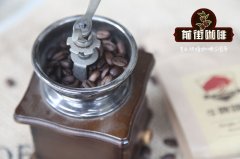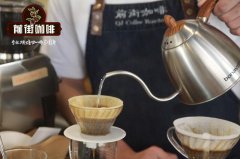Karana, Bali | Ubu treatment site of Jinta Mani Volcano | Honey treatment Smuri 795, tin pickup flavor

Professional coffee knowledge exchange more coffee bean information please follow the coffee workshop (Wechat official account cafe_style)
Bali Karana | Jinta Mani Volcano Ubu treatment site | Honey treatment Smuri 795, tin pickup flavor?
Harvest red ripe coffee cherries, put them in a bag for 12 hours of dry fermentation and send them to Wubu. After picking out the unripe beans by hand, the whole batch of coffee cherries are laid flat on a high dry shelf for sun fermentation. According to the weather temperature and dry humidity, each batch needs to be dried for about 21 to 30 days. At the same time, it must be stirred once an hour to pick out the defective fruit, and finally throw away the flesh outside the raw beans. Remove the sheepskin shell and manually pick out defective beans in order to improve the level and flavor of coffee raw beans. In the traditional culture of Bali, coffee is used as a cheap beverage raw material. The flavor and quality of the producing area have been in an unstable or low state, and most of them have become cheap commercial beans. Rodney and his partners decided to change the local stereotype of coffee. They chose the Wubu Market area, the cultural center of Bali, and opened the only boutique coffee shop on the island. Rodney and two other partners themselves also obtained the international coffee Q certification.
It is the only local cafe with this certification for the quality of its own coffee; it has two bean dryers from 1kg and 4kg, and all the coffee in the cafe comes from high-quality raw beans from the local or nearby producing areas (e.g. Java, Sulawesi, New Guinea, Florus) and so on. The success of the cafe has given them more motivation to pursue high-quality coffee sources. a few years ago, local coffee beans in Bali were processed by farmers in the Kintamani mountainous areas. however, regardless of weather factors, berry quality, post-production environment and other factors, it is always difficult for them to master the quality of raw beans in the past year. Since 2015,
Rodney decided to build its own processing plant next to its vestibule and cafe. When the harvest season came last year, they went to the Jintamani area at an altitude of 1400 meters to buy high-quality coffee berries. After part of the post-production, they were carried to the stable Wubu District, which is 1400 meters above sea level, for post-processing. This year, Rodney successfully experimented with three different batches, including water washing, honey treatment and sun treatment, and three different processing methods, the flavor greatly exceeded the general batches of origin, and the overall defect rate and uniformity were even better than those of fine beans in Central America. Water washing and honey treatment had bright and complex acidity, and the sun treatment batches were even better than those of Panama Manor. There are more ripe peaches, pineapples, mangoes and other tropical fruits, fruit wine aromas and finish.
The concept of Karana has received a great response in Bali, but apart from coffee itself and commercial achievements, they also recognize the problems of local life, education, industry, culture, and so on, so in the process of selling coffee, they also return its profits to the children's educational institutions in the local village to contribute to the education of future children, such as building schools or purchasing educational equipment.
Flavor description:
Raw beans exude strong cantaloupe and tropical fruit aromas; the entrance flavor changes to the sweetness of pineapple and strawberry jam, showing smooth and rich acidity at medium and low temperatures, with sweet flavors of handmade black sugar, exquisite dark chocolate and hazelnuts; the overall flavor is excellent, with syrup-like texture and sweet taste, and the ripe fruit flavor of the sun even surpasses many well-known Central American estates.
Jintamani (Kintamani) in the producing area
Producer Rodney Glick
Processing plant: Wubuzhu management field (Ubud)
Treatment: washing / honey treatment / sun treatment
Varieties USDA (U.S. Department of Agriculture), Kar?ka (TypicaHybrid),
Smuri 795 (Typica Hybrid-Jember)
1400 meters above sea level
Soil: black volcanic soil
Harvest season: June to September
Qianjie recommendation:
Filter cup: Hario V60
Water temperature: 90 degrees
Degree of grinding: small Fuji 3.5
Cooking methods: the ratio of water to powder is 1:15, 15g powder, the first injection of 25g water, 25 s steaming, the second injection to 120g water cut off, waiting for the powder bed water to half and then water injection, slow water injection until 225g water, extraction time about 2:00
Analysis: using three-stage brewing to clarify the flavor of the front, middle and back of the coffee. Because V60 has many ribs and the drainage speed is fast, it can prolong the extraction time when the water is cut off.
Important Notice :
前街咖啡 FrontStreet Coffee has moved to new addredd:
FrontStreet Coffee Address: 315,Donghua East Road,GuangZhou
Tel:020 38364473
- Prev

Information introduction of Notre Dame Light Manor in Brazil-suggestion on making Yellow bourbon Coffee in the Sun of Notre Dame Light Manor
Professional coffee knowledge exchange more coffee bean information please follow the coffee workshop (Wechat official account cafe_style) the light of Notre Dame from Anlin Coffee the Brazilian yellow bourbon stems from a glimpse at this year's coffee exhibition. We once launched this Brazilian yellow bourbon, but it was a pity that it was sold out before we could taste it. this time,
- Next

Brazilian birch coffee beans delicious?_Brazil Fazenda Camocim Manor Information
Professional coffee knowledge exchange More coffee bean information Please pay attention to coffee workshop (Weixin Official Accounts cafe_style) Brazil, as the world's largest coffee producer, has not been in the spotlight in recent years. Many times our evaluation of Brazilian coffee is balanced, with a nutty caramel cream chocolate flavor presentation, high body and perfect blending beans. But Bai Hua
Related
- Detailed explanation of Jadeite planting Land in Panamanian Jadeite Manor introduction to the grading system of Jadeite competitive bidding, Red bid, Green bid and Rose Summer
- Story of Coffee planting in Brenka region of Costa Rica Stonehenge Manor anaerobic heavy honey treatment of flavor mouth
- What's on the barrel of Blue Mountain Coffee beans?
- Can American coffee also pull flowers? How to use hot American style to pull out a good-looking pattern?
- Can you make a cold extract with coffee beans? What is the right proportion for cold-extracted coffee formula?
- Indonesian PWN Gold Mandrine Coffee Origin Features Flavor How to Chong? Mandolin coffee is American.
- A brief introduction to the flavor characteristics of Brazilian yellow bourbon coffee beans
- What is the effect of different water quality on the flavor of cold-extracted coffee? What kind of water is best for brewing coffee?
- Why do you think of Rose Summer whenever you mention Panamanian coffee?
- Introduction to the characteristics of authentic blue mountain coffee bean producing areas? What is the CIB Coffee Authority in Jamaica?

